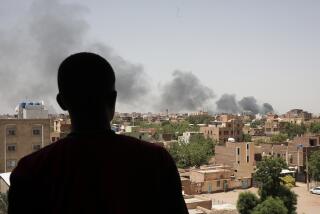Trailing ‘Lost Boys’ as They Find Their Way
- Share via
In one of the most illustrative scenes of “Dateline NBC’s” special report, “The Lost Boys,” four thoughtful and inquisitive Sudanese men who arrived in this country after nearly a decade in a Kenyan refugee camp ask anchorman Tom Brokaw a few questions about American culture.
One wants to know why men don’t hold hands here. Another wants Brokaw to confirm the unimaginable--that American women sometimes speak to men first. Brokaw’s answers and the young men’s reactions cut to the heart of Sunday’s hourlong special.
“To see America through their eyes is to hear the questions, and by looking at us as if we had arrived from a separate cosmos, they had appropriate and legitimate questions,” Brokaw said from his office in New York.
The four were part of a massive wave of child refugees who experts say witnessed one of the most violent civil wars of the last century. Strife between Sudan’s Muslim government in the north and rebels in the south drove thousands of boys out of their villages in the 1980s. For four years these boys, known internationally simply as “the Lost Boys,” walked a thousand miles across the arid landscape of northern Africa until they finally arrived at a United Nations refugee camp in Kenya.
For nine years the boys ate one meal a day and enrolled in a makeshift school at the camp. In 1999, UN officials and the U.S. State Department selected 3,600 to begin a new life in the United States, in cities such as Rochester, N.Y., and Seattle.
A camera crew following the group during their layover in Europe recorded their first experience with hand-sensor faucets in the men’s room. Brokaw caught up with them in Rochester six days after they arrived this spring and spent several days with another group in Seattle this summer.
“They came from a kind of a Middle Ages existence into the 21st century,” Brokaw said. The learning curve is steep. Almost every task of daily life here--using a faucet, flushing a toilet, opening a refrigerator and using a can opener--is new for them.
The tasks seem ridiculous compared with the boys’ ability to survive in unimaginable circumstances. According to a New York Times Magazine article on the refugee group published in April, about 97% of the boys had witnessed a killing during the migration. Eighty-five percent had watched someone die from starvation. Ninety-two percent had been shot at.
Most of the men are deeply religious and say God protected them from the crocodiles and lions that devoured other children near them.
With no knowledge of their own ages or birth dates, the boys accepted ages that aid workers in Kenya hastily estimated. Once inside the camp, they hung together in small groups, putting distance between themselves and years of malnutrition and violence.
“There is this great, innate intelligence. It is a form of social Darwinism,” Brokaw said. “They made their way across the hostile landscape, forming bands and families to do that. These are people who have great deductive and reasoning senses and a great idea of what is going on around them.”
Through the UN and the State Department, the Lost Boys have been given four months of subsidies and mentorship from Catholic aid workers. Several men try to make the most of their time by getting their high school equivalency diploma at night while taking a nurse certification course during the day. It proves overwhelming, and since they feel pressure to be employed by the time their subsidies expire, the men drop their night classes.
They will not be returned to Sudan if they cannot earn a living, but the international project aims to make the Lost Boys self-sufficient men.
“I’m constantly interested in this whole idea of the adaptation of people in this country. It’s who we are,” said Brokaw, who has written three books on the veterans of World War II. “I’m always amazed at the resilience of the human spirit.”
Brokaw said he hopes NBC will enable him to revisit the men over the next year, as their uneven assimilation process continues.
But he acknowledged the struggle to win over viewers in prime time with earnest, in-depth reporting.
“This is a tough sell,” Brokaw said. “I know.”
*
“Dateline NBC’s” special, “The Lost Boys,” can be seen Sunday night at 7.
More to Read
The complete guide to home viewing
Get Screen Gab for everything about the TV shows and streaming movies everyone’s talking about.
You may occasionally receive promotional content from the Los Angeles Times.






